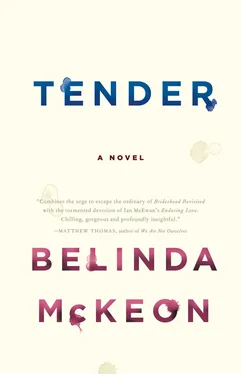“I think so.”
“Do you write anything else?”
She swallowed. “Poetry,” she said, and instantly regretted it; his eyes had lit up with something, and she was pretty sure it was scorn. “I mean, it’s shit, obviously.”
He frowned. “Why obviously?”
“Never mind.”
He was regarding her steadily. “I think it’s a very good thing that you write poetry. A very good thing indeed.”
She squirmed. “Don’t be ridiculous.”
“What’s ridiculous about it?”
“ It’s ridiculous. This is ridiculous. My point is, I’m meant to have called up the editor of the local paper at home, I’m meant to have done it six months ago, and I told my mother that I would, and I never did it.” She took a breath. “And now I’m going home tomorrow, and she thinks I have a job, and I want to have a job, and I don’t. And I’m dead when my mother finds out.”
He frowned. “Is your mother a very violent woman, Catherine?”
She burst out laughing. “Fuck off.”
“Will she beat you? Will she lock you in the shed?”
“Fuck off. I should have done it. I shouldn’t have put it off.”
He looked at his watch. “It’s half past two,” he said. “How many hours behind is Longford?”
She stared at him. “Oh, very funny,” she said, after a moment. “Sure you’re from Leitrim.”
He shrugged. “Leitrim’s another time zone entirely.”
“ Stop. It’s not funny.”
“Indeed it is not,” he said, and he got to his feet. “Come on,” he said, reaching a hand out to where she sat, looking up at him.
“Come on what?”
“Come on up,” he said. “There’s a phone in the hall, isn’t there?”
“I can’t call him now. ”
“Now is better than tomorrow.”
“No,” she said, shaking her head. “It’s too late. It’s months too late. I’m going to have to forget about it.”
“And what? Live all summer on the proceeds of your poems? Come on.”
“No,” she protested, as he pulled her to her feet; he stepped back to make room for her, and in the next moment they were standing in the middle of the room, clasping hands. James was looking at her with an expression of resolve beneath the surface of which a fit of laughter seemed to be twitching, but he did not laugh; he did not even smile.
“Number?” he said briskly.
“It’s in my room,” she said, with an air of misery.
“Change?” he said, and he rooted in his jeans pocket. “Here you go,” he said, handing her a fifty-pence piece.
“Oh fuck, ” Catherine moaned. “I’m not even dressed.”
“It’s a phone, Catherine. Come on. We’re getting this over with, and then we’re going to drink some stolen wine.”
“Some what?”
“From the back of our Eddie’s lorry,” he said grimly, as he pushed her towards her bedroom door. “I think I earned that much. Anyway, I’m fairly sure he was stealing it in the first place.”
As she was finding the editor’s number in her address book, a new thought occurred to her. “I don’t want you standing beside me while I’m talking to him,” she shouted out to James.
He appeared at the door. “You’re terrible, Muriel,” he said, nodding towards the poster on the wardrobe.
“Seriously,” Catherine said. “You’re not standing beside me.”
“I haven’t the slightest interest in standing beside you,” he sniffed.
“And no listening at the door.”
“No listening at the door? No getting back in the door if you don’t do what you’re meant to do. Now go on.” He pointed. “And don’t come back in here without a job to your name. Do you want our poor children to starve?”
“Oh, God,” Catherine moaned through her laughter as he marched her to the outer hall. “Why did you ever have to come home?”
* * *
That night was for all of them. Amy and Lorraine came home from their exams, and they launched themselves at James, whooped and cheered and even cried because he was home, and there were moments when Catherine felt, again, like an outsider as she watched them, as she saw how easy and how happy they were with each other, but that went away; the way that James behaved towards her sent it away. That night was for all of them, cooking dinner together in the house and heading out into the night afterwards, down to Searson’s and on to O’Donoghue’s and on to dance in Rí-Rá, and stumbling, laughing, home through the streets. And the next day — Catherine postponed her journey back to Longford — was for her and James, wandering around the city, going to IMMA and St. Patrick’s Cathedral and into the gardens behind Dublin Castle, all the places she had not been to yet, all the places it had not occurred to her yet to go, and through campus, where she felt as though she was showing the place off to him, and on towards the National Gallery, except that they did not end up in the National Gallery; they ended up, instead, in a strange little pub called the Lincoln’s Inn. And that night was another night for all of them, and the next day was not a day, either, when Catherine felt like taking the train home, and that day she and James stayed in Baggot Street and talked again for hours and hours, and that night was another night of drinking and dancing, and the next day was Friday, and Catherine finally had to face up to Longford, and to the long, empty months ahead, and, feeling really heartbroken, she packed her rucksack, and she said goodbye to the girls, and James said he would go with her as far as Connolly station, that he would help her with her bags. And at the station, as they waited, Catherine said, I want you to hear something with me; I want you to listen to the lyrics of this song. Listen. Listen .
* * *
“Dreams fled away. What’s the rest of that line?”
“What line?” James said lazily, from the other end of the blanket.
“You know, from the Thomas Kinsella poem, the one about September.”
“ I don’t know.”
“It was on the Leaving curriculum. You have to have done it. Everyone had to do it.”
“I don’t know, Reilly. You’re meant to be the poet.” He pulled his legs towards him, let them drop back again. She felt him wriggle in closer to her.
“I don’t know what’s happening to my memory,” she said, trying to ignore her heart, the way it was going faster.
James sighed. “Dreams fled away. And the fire brought a crowd in?”
“Those are two completely different poems! The second one’s Austin Clarke. Did you seriously think that was the line?”
“I don’t know, I told you,” he said impatiently. “I don’t remember my bloody Leaving Cert homework.”
“When night stirred at sea—”
“Lookit, can you stir over a bit on the blanket there, please, while you’re speaking of stirring. I’ve got far too much of the grass.”
“We need two blankets, really,” Catherine said hopefully.
He made a noise of exasperation. “Well, I’m not going into the house again. I just got another earful from my mother about this fucking wedding.”
“Really?”
“Yeah. She’s still nagging at me to go. And to bring you with me. Fuck’s sake.”
“Well, I don’t mind.”
“You must be joking.” He sat up; his shadow dropped onto her. “Whose side are you on?”
“OK, OK,” she said, holding up a hand. “I just don’t want to cause trouble.”
“Trouble?” he almost spat. “You’re not causing trouble. You’re helping me out.”
“Well, good, then,” she said uncertainly.
“Good,” he echoed, and seeming satisfied, he sank back down.
* * *
James, when Catherine had phoned him earlier that week, had announced that she was going to join him at his parents’ house in Leitrim on Friday evening and stay for the whole weekend. It was a masterful plan, he declared, because it would mean that he could go down home, which it was about time he did anyway, having been back in Ireland for over a month, and having Catherine with him would mean that he could visit his parents without having to go to the awful neighbor’s wedding to which he had been invited, because Catherine’s presence would get him off the hook. At the same time, it would mean that the two of them could see each other again, because there was only so much you could talk about on the phone. Catherine lived on the same train line that he would be taking to Leitrim, so they could meet halfway and travel down together, and on Sunday they could leave together again, and she would get off the train in Longford, and he would go on to Dublin.
Читать дальше












